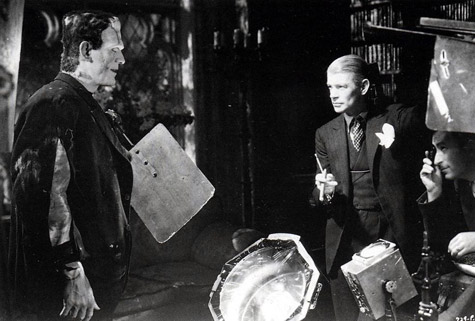James Whale was born into a large family in Dudley, Worcestershire, England. He was the sixth of seven children of William and Sarah. At an early age he discovered his creative side and began to study art.
He enlisted in the British Army at the outbreak of World War I and became an officer. He was captured by the Germans on the Western Front in 1917 and became a prisoner of war. While a prisoner, James became interested in acting, directing and set design in amateur theater productions put on inside the prison camp.
After the war, he started a career in theater and began to act, stage direct and set design on several productions. James directed a play in 1928 called Journey's End. The play was set over a four-day period in March 1918 in the trenches at Saint-Quentin, France. The play gave a glimpse into the experiences of British officers in World War I. Captain Stanhope, the company commander, and Lieutenant Raleigh, the brother of Stanhope's fiancée is the key conflict in the play. The part of Stanhope went to a little known actor who would become a super star by the name of Laurence Olivier.
With the success of Journey's End, Whale would go the United States and direct the New York production which had an all British cast. The play was considered to be the greatest play about World War I. After a few more productions of Journey's End in the states, James set his focus on Hollywood directing the film version of Journey's End starring Colin Clive for Gainsborough Pictures and Tiffany Productions.
In 1931, Whale signed a 5 year deal with Universal Pictures. His first picture was Waterloo Bridge, based on a Broadway play but it was his second picture that would put Whale on a path to glory. Universal Chief Carl Laemmle, Jr. offered Whale any property he wanted that was owned by the studio. He chose Frankenstein because the other properties were either uninteresting or were war pictures. Production was fast, beginning on August 24, 1931 and wrapping on October 3rd. Previews were held on October 29th with a wide release date of November 21st. The film was a smash, taking in a whopping $12 million on it's initial release. Whale would once again use Colin Clive to play Henry Frankenstein and a little known actor at the time by the name of Boris Karloff to play the Monster.
Whale would go on to direct many more films in the 1930s but would be known for being one of Universal Pictures most prolific horror directors (though he disliked the label) with the features The Old Dark House (1932), The Invisible Man (1933) and what many consider his greatest film, The Bride of Frankenstein (1935).
James Whale would retire from directing in 1941 with the exception being an Army training film in 1942 and the unreleased 1949 short Hello Out There.
Whale would try to live a quiet life for the most part in the 1950s with his partner David Lewis until a split by the two in 1952. Whale and Lewis had been together since 1930 and Whale was an openly gay man, which was unheard of back in the 1920s and 30s. After 23 years, Whale and Lewis would remain friends though Whale would get together with Pierre Foegel, the reason for the breakup.
After a series of strokes and diminishing mental faculties, Whale would commit suicide by drowning in his own pool on May, 29, 1957. David Lewis found the suicide note but kept it hidden until shortly before his own death in 1987.
A feature film depicting the last days of Whale would be released in 1998 called Gods and Monsters starring Ian McKellen as Whale.
Below: Director James Whale consults Boris Karloff on the set of The Bride of Frankenstein.

Other Vital Statistics:
Born
James Whale
22 July 1889
Dudley, Worcestershire, England
Died
9 May 1957 (aged 67)
Hollywood, California, United States
Trivia:
Retired from making films in 1941, except for an Army training film (Personnel Placement in the Army (1942)) and the unreleased Hello Out There (1949).
Four of his films were nominated for AFI's 100 Years...100 Thrills: Frankenstein (1931), The Invisible Man (1933), Bride of Frankenstein (1935) and The Man in the Iron Mask (1939). "Frankenstein" made the list at #56.
Life partner David Lewis found him dead in Whale's Santa Monica swimming pool; he didn't disclose the suicide note until close to his own death in 1987, leaving Whale's death - up to that time - a mystery.
Quotes:
[on Boris Karloff] "His face fascinated me. I made drawings of his head, adding sharp bony ridges where I imagined the skull might have joined."
"A director must be pretty bad if he can't get a thrill out of war, murder, robbery."
Other Places of Interest:
IMDB
Correspondence with Ian McKellen (on Gods and Monsters)
Back to
the Features Page
|

